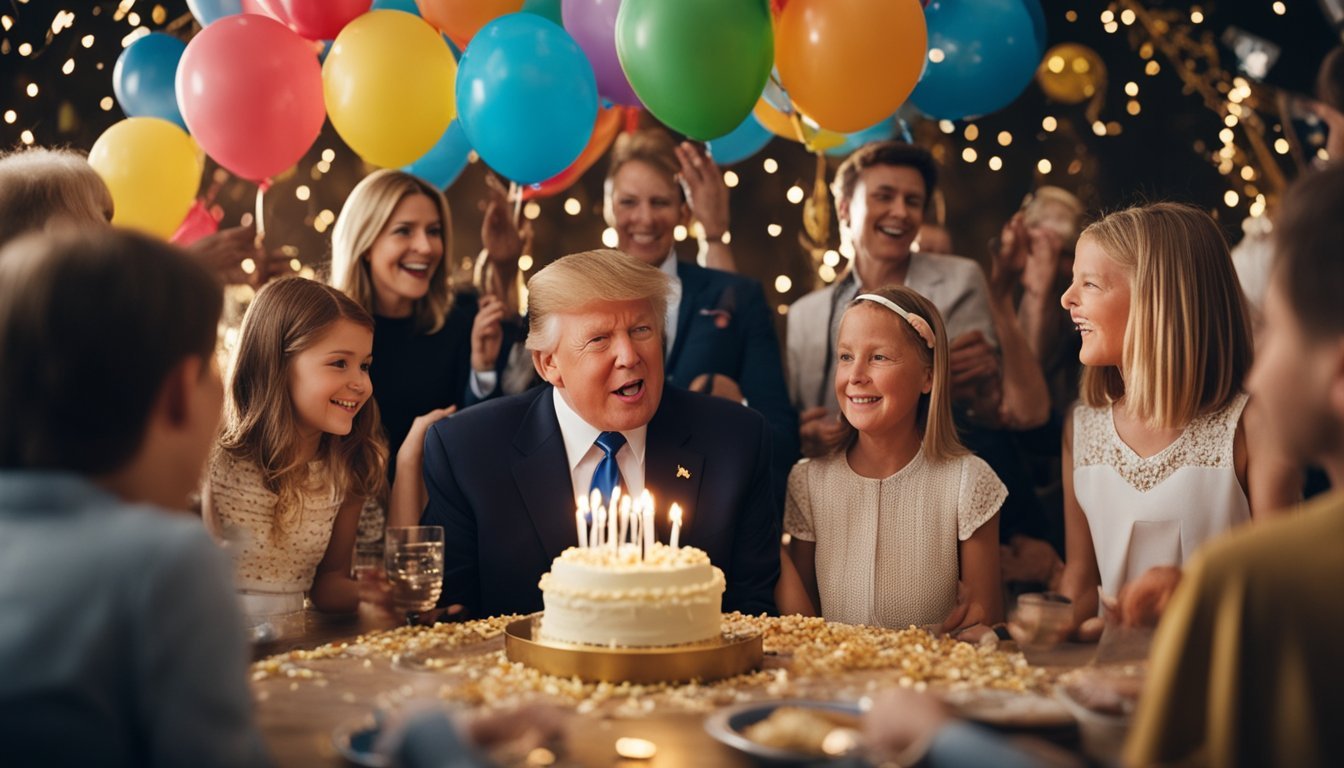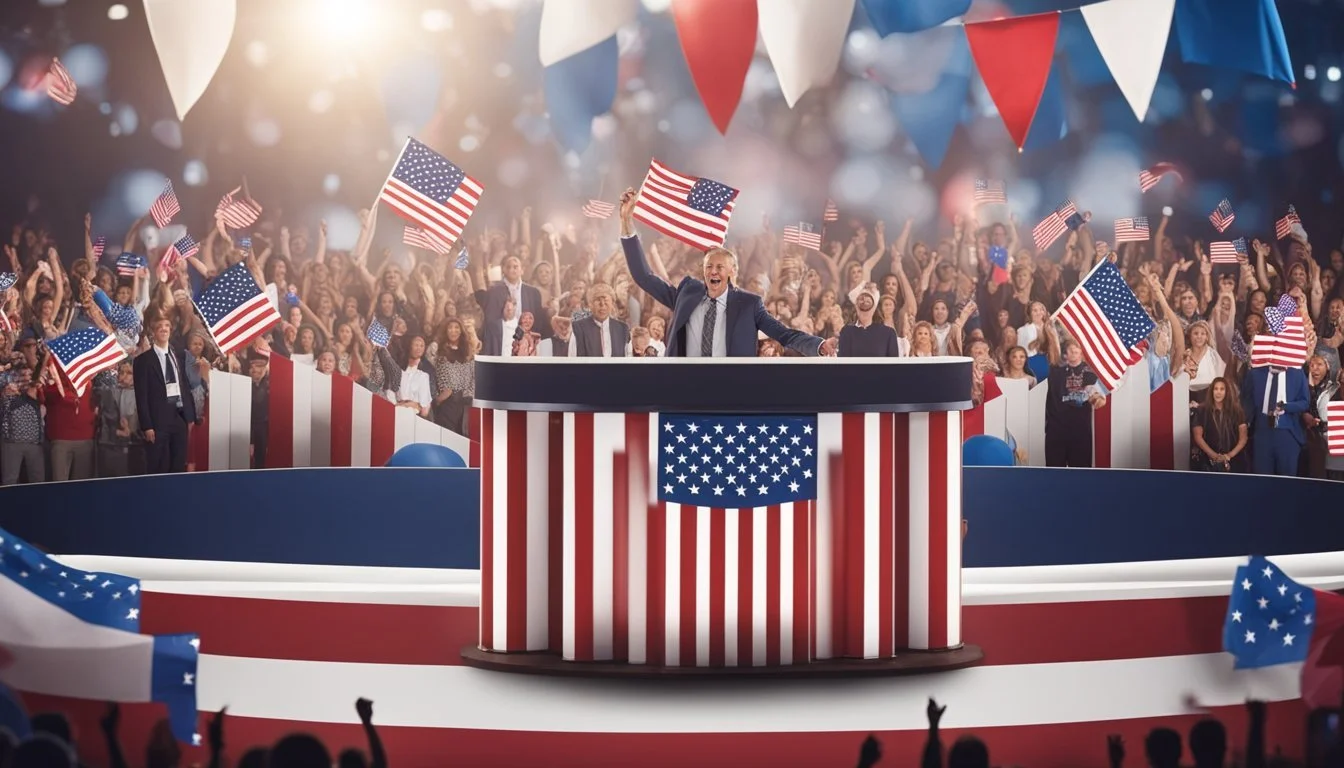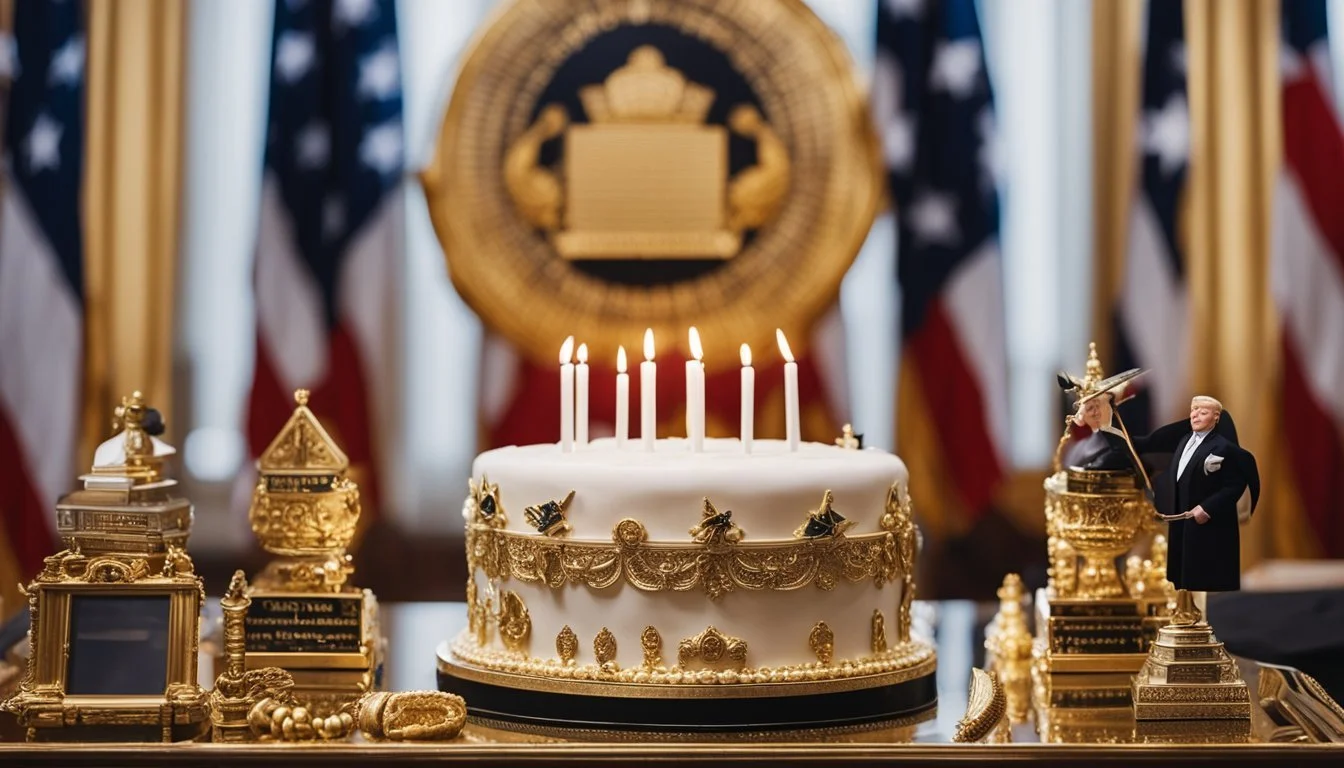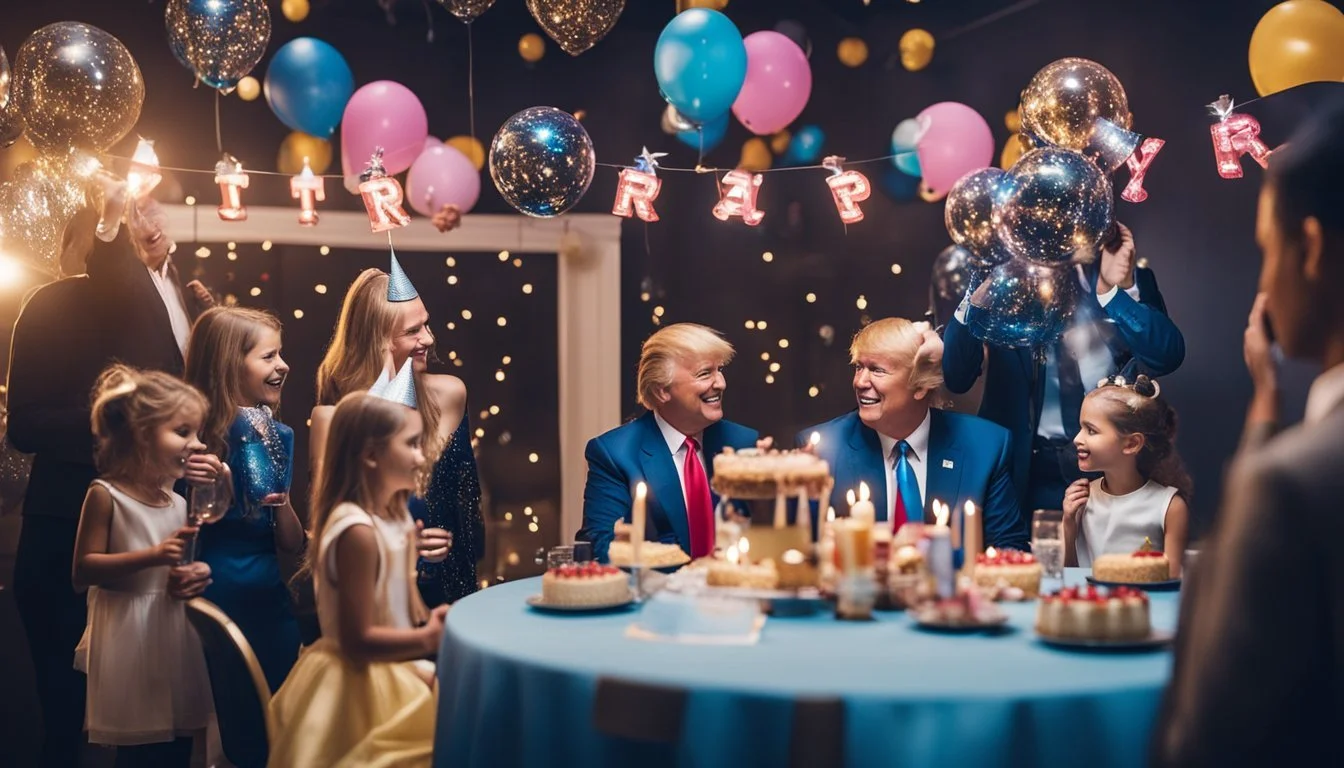Celebrating Donald Trump on His Presidential Birthday
Former President Turns 78 in 2024
Donald Trump celebrated his 78th birthday on June 14, 2024. As the oldest Republican presidential nominee in history, his age has become a notable topic in the 2024 election cycle. Questions about Trump's mental fitness and ability to lead have surfaced, mirroring similar concerns raised about his rival, President Joe Biden.
If reelected, Trump would complete his term at nearly 83 years old, surpassing Biden's current age. This fact has sparked debates about the suitability of older candidates for the demanding role of president. Trump's supporters argue that his experience and track record outweigh age concerns, while critics suggest the country needs younger leadership.
The age discussion extends beyond Trump himself. His contemporary, former President Bill Clinton, recently turned 78 as well, highlighting the generational shift in American politics. As the election approaches, voters will weigh the candidates' ages alongside their policies and leadership qualities.
Early Life and Education
Donald Trump's formative years were shaped by his family background, upbringing in New York, and educational experiences at various institutions. These early influences played a significant role in his personal and professional development.
Birth and Family
Donald John Trump was born on June 14, 1946, in Queens, New York. He was the fourth of five children born to Fred Trump, a successful real estate developer, and Mary Anne MacLeod Trump, a Scottish immigrant.
The Trump family lived in the affluent Jamaica Estates neighborhood. Fred Trump's business success provided a comfortable lifestyle for young Donald and his siblings.
Donald's early exposure to the real estate industry through his father's work would later influence his career path.
Education at New York Military Academy and Fordham University
At age 13, Trump's parents enrolled him in the New York Military Academy. This decision was made to instill discipline and focus in the energetic young Trump.
He excelled in athletics and academics at the academy, graduating in 1964. Trump then attended Fordham University in the Bronx for two years.
During his time at Fordham, Trump continued to show promise in his studies, particularly in business-related subjects.
Transfer to Wharton School of Finance and Commerce
In 1966, Trump transferred to the University of Pennsylvania's Wharton School of Finance and Commerce. This move aligned with his growing interest in business and finance.
At Wharton, Trump studied economics and real estate. He graduated in 1968 with a Bachelor of Science degree in economics.
Trump's education at Wharton provided him with valuable knowledge and skills that would later prove useful in his business career. The prestigious reputation of the Wharton School also added credibility to his professional profile.
Business Career
Donald Trump built a vast business empire spanning real estate, casinos, hotels, and entertainment. His career was marked by ambitious projects, high-profile deals, and occasional controversies.
Expansion into Manhattan Real Estate
Trump joined his father's real estate company in 1971. He soon set his sights on Manhattan, making his first major deal by acquiring the bankrupt Commodore Hotel. Trump transformed it into the Grand Hyatt, establishing himself as a rising developer in New York City.
In 1983, Trump completed his signature project: Trump Tower. The 58-story skyscraper on Fifth Avenue became a symbol of his growing brand and ambition. Its gleaming facade and luxury amenities attracted high-profile tenants and buyers.
Trump continued to acquire and develop properties throughout Manhattan in the 1980s. He purchased the Plaza Hotel in 1988 for $407 million, fulfilling a longtime goal.
Growth of The Trump Organization
The Trump Organization expanded rapidly under Donald's leadership. He diversified into various industries beyond real estate.
Trump acquired the Eastern Air Lines Shuttle in 1989, rebranding it as Trump Shuttle. Though short-lived, it showcased his growing business interests.
He ventured into entertainment, purchasing the Miss Universe pageant in 1996. Trump's media presence grew through appearances and eventually his own reality TV show, "The Apprentice."
The company developed numerous golf courses and resorts worldwide. These properties became a significant part of the Trump brand.
Ventures in Atlantic City and Other Business Endeavors
Atlantic City became a major focus for Trump in the 1980s and 1990s. He acquired and developed several casino properties, including Trump Plaza, Trump Castle, and Trump Taj Mahal.
These casinos initially brought Trump significant wealth and notoriety. However, they also faced financial difficulties and bankruptcies in later years.
Trump's other ventures included Trump University, a series of real estate seminars. It later faced legal challenges and was eventually shut down.
He launched Trump Steaks, Trump Vodka, and other branded products. While many were short-lived, they expanded his brand recognition.
Financial Comeback and Licensing
After facing financial difficulties in the 1990s, Trump engineered a comeback. He shifted focus to licensing his name to other developers and products.
Trump licensed his name to numerous buildings he didn't own or develop. This strategy proved lucrative and expanded his brand globally.
He leveraged his celebrity status through "The Apprentice" TV series. The show significantly boosted Trump's public profile and earnings.
By the 2000s, Trump's business model increasingly relied on licensing and brand management. This approach helped rebuild his wealth and set the stage for his later political career.
Public Figure and Media Personality
Donald Trump cultivated a larger-than-life public persona through his business ventures, television appearances, and bestselling books. His brash style and memorable catchphrases made him a household name well before entering politics.
The Apprentice and Public Persona
"The Apprentice" catapulted Trump to new levels of fame when it premiered in 2004. As host and executive producer, he presided over aspiring entrepreneurs competing for a job in his organization. The show's signature line "You're fired!" became closely associated with Trump's image.
The reality series ran for 14 seasons, with Trump hosting the first 14. It showcased his business acumen and dealmaking skills to millions of viewers each week. The program's success further elevated Trump's status as a celebrity businessman.
Trump's public persona extended beyond the show. He made frequent media appearances, gave provocative interviews, and maintained an active social media presence. His outspoken nature and controversial statements often generated headlines.
Author of The Art of The Deal
Trump's 1987 book "The Art of the Deal" became a bestseller and cemented his reputation as a skilled negotiator. Co-written with journalist Tony Schwartz, the book offered Trump's business philosophy and advice on dealmaking.
"The Art of the Deal" spent 48 weeks on The New York Times Best Seller list. It helped establish Trump as a business guru and self-made success story in the public eye. The book's popularity led to several follow-up titles on business and success.
Trump's writing career continued with books like "Trump: The Art of the Comeback" and "Trump: How to Get Rich." These works further promoted his personal brand and business expertise to a wide audience.
Involvement in Professional Sports
Trump's business interests extended into professional sports, most notably with his ownership of the New Jersey Generals in the United States Football League (USFL). He purchased the team in 1983 and made a splash by signing star players like Herschel Walker.
As an owner, Trump pushed for the USFL to compete directly with the NFL by moving to a fall schedule. This strategy ultimately contributed to the league's demise in 1986 after just three seasons.
Trump also dabbled in boxing promotion, hosting several high-profile fights at his casinos in Atlantic City. He was inducted into the New Jersey Boxing Hall of Fame in 2015 for his contributions to the sport.
Presidential Campaign and Politics
Donald Trump's political career has been marked by unconventional strategies and polarizing rhetoric. His campaigns and policy positions have reshaped the Republican Party and American politics.
2016 Presidential Campaign and Election
Trump launched his 2016 presidential bid as a political outsider, using the slogan "Make America Great Again." He defeated a crowded field of Republican primary opponents with his populist message and media-savvy approach. In the general election, Trump faced off against Democratic nominee Hillary Clinton.
Key campaign issues included:
Immigration reform and building a border wall
Renegotiating trade deals
Repealing and replacing Obamacare
Trump's victory in the Electoral College, despite losing the popular vote, stunned many political observers. His win was fueled by strong support in rural areas and Rust Belt states.
Political Positions and Campaign Rhetoric
Trump's political stances often defied traditional Republican orthodoxy. He took a hardline approach on illegal immigration, vowing to build a wall on the U.S.-Mexico border. Trump criticized political correctness and establishment politics.
On trade, he advocated for protectionist policies and renegotiating international agreements. Trump's foreign policy emphasized an "America First" approach, questioning long-standing alliances and international commitments.
His brash communication style and use of social media set him apart from typical politicians. Critics accused Trump of divisive rhetoric, while supporters praised his willingness to speak bluntly.
Fundraising and Key Endorsements
Trump's 2016 campaign relied heavily on earned media coverage, spending less on traditional advertising than his rivals. He self-funded much of his primary campaign before transitioning to more conventional fundraising methods in the general election.
Notable endorsements included:
Former Alaska Governor Sarah Palin
New Jersey Governor Chris Christie
Alabama Senator Jeff Sessions
Trump faced resistance from some Republican establishment figures. However, he gradually won over most party leaders and officials as his nomination became inevitable.
Presidency
Donald Trump served as the 45th President of the United States from 2017 to 2021. His tenure was marked by significant policy changes, international relations shifts, and domestic controversies.
Inauguration and Key Administrative Policies
Trump took office on January 20, 2017, delivering an inaugural address focused on "America First" policies. He quickly assembled his Cabinet, appointing figures like Rex Tillerson as Secretary of State and Steve Mnuchin as Treasury Secretary.
Key policy initiatives included tax cuts, deregulation efforts, and attempts to repeal the Affordable Care Act. Trump also pursued stricter immigration policies, including travel bans on several predominantly Muslim countries and efforts to build a wall along the U.S.-Mexico border.
His administration prioritized conservative judicial appointments, successfully nominating three Supreme Court justices: Neil Gorsuch, Brett Kavanaugh, and Amy Coney Barrett.
Domestic and International Affairs
On the domestic front, Trump oversaw a strong economy with low unemployment rates before the COVID-19 pandemic. His response to the pandemic faced criticism for downplaying its severity initially.
In international affairs, Trump adopted an unconventional approach. He met with North Korean leader Kim Jong-un, withdrew from the Iran nuclear deal, and renegotiated trade agreements like NAFTA.
Trump's "America First" foreign policy led to tensions with traditional allies and a more confrontational stance towards China. He also recognized Jerusalem as Israel's capital and moved the U.S. embassy there.
Controversies and Impeachment
Trump's presidency was marked by numerous controversies. He faced two impeachment trials, becoming the first U.S. president to be impeached twice.
The first impeachment in 2019 centered on allegations of abuse of power and obstruction of Congress related to Trump's dealings with Ukraine and investigations into Hunter Biden.
The second impeachment occurred in January 2021, following the January 6 Capitol attack. Trump was charged with incitement of insurrection but was acquitted in both Senate trials.
Other controversies included disputes over his tax returns, allegations of Russian interference in the 2016 election, and his handling of racial justice protests in 2020.
Post-Presidency
Donald Trump's post-presidency has been marked by continued political activity and legal challenges. He remains a influential figure in Republican politics while facing multiple investigations.
Ongoing Influence and Political Activity
Trump maintains significant sway within the Republican Party. He endorses candidates in primary elections and holds rallies to support them. His political action committees raise substantial funds from supporters. Trump frequently criticizes the Biden administration and other political opponents through statements and social media posts. He has hinted at another presidential run in 2024, keeping his name in the spotlight.
Some Republican leaders distance themselves from Trump, while others embrace his continued involvement. His post-presidency activities shape GOP messaging and policy positions on issues like immigration and election integrity.
Legal Challenges and Investigations
Trump faces several ongoing legal issues since leaving office. The FBI searched his Mar-a-Lago residence in 2022 over concerns about mishandled classified documents. Special Counsel Jack Smith is investigating Trump's actions related to the January 6 Capitol attack and efforts to overturn the 2020 election results.
State and local prosecutors are also pursuing cases against Trump. The Manhattan District Attorney's office brought criminal charges related to hush money payments. In Georgia, prosecutors are examining Trump's attempts to influence the state's 2020 vote count.
Trump denies wrongdoing in all cases. He claims the investigations are politically motivated. His legal team works to delay or dismiss various charges and subpoenas.
Personal Life
Donald Trump's personal life has been marked by multiple marriages, a large family, and high-profile business pursuits. His lifestyle choices and personal interests have often garnered significant public attention.
Marriages and Family
Trump has been married three times. His first wife was Ivana Trump, with whom he had three children: Donald Jr., Ivanka, and Eric. After their divorce, he married Marla Maples. They had one daughter, Tiffany.
Trump's current wife is Melania Knauss. They married in 2005 and have one son, Barron.
Trump's adult children have been involved in his business empire and political career. Donald Jr. and Eric have managed Trump Organization properties. Ivanka has served as an advisor during Trump's presidency.
Personal Interests and Lifestyle
Golf is one of Trump's main hobbies. He owns numerous golf courses and frequently plays the sport.
Mar-a-Lago, his Florida estate, serves as both a private club and his primary residence since leaving office. The property has hosted international leaders and high-profile events.
Trump is known for his luxurious lifestyle, including private jet travel and lavish properties. He has a preference for well-done steak and Diet Coke.
His TV appearances, especially on "The Apprentice," helped cultivate his public persona as a decisive businessman.
Cultural and Social Impact
Donald Trump's birthday celebrations have become cultural phenomena, sparking media attention and public discourse. His age and public persona continue to shape political and social conversations.
Influence on Media and Television
Trump's birthdays often generate significant media coverage. News outlets report on his celebrations, statements, and supporters' events. His birthday appearances on television draw high ratings, reflecting his enduring influence on viewership.
Social media platforms see increased activity around Trump's birthday. Supporters share well-wishes and tributes, while critics voice opposing views. This online engagement demonstrates Trump's ongoing ability to dominate digital conversations.
Contributions and Impact on Popular Culture
Trump's birthdays have inspired merchandise, memes, and cultural references. His age has become a topic of political debate, with comparisons drawn to other political figures.
Trump's birthday statements often make headlines, sometimes including controversial remarks or policy announcements. These moments can shape public discourse and political narratives for days or weeks afterward.
His birthday celebrations have evolved into rallying events for supporters. These gatherings feature MAGA-themed decorations, speeches, and displays of political loyalty, reinforcing Trump's cultural impact beyond his presidency.
Legacy and Historical Significance
Donald Trump's presidency left a significant mark on American politics and society. His unconventional approach and controversial policies continue to shape discussions about governance, media relations, and democratic norms.
Business and Economic Impact
Trump's business background influenced his economic policies. He implemented corporate tax cuts and reduced regulations, aiming to stimulate economic growth. The stock market reached record highs during his tenure, though critics argue the benefits were unevenly distributed.
His trade policies, particularly with China, reshaped global commerce. The "America First" approach led to renegotiated trade deals and tariffs on imported goods. These actions had mixed economic effects, boosting some industries while increasing costs for others.
Trump's personal finances and business practices came under scrutiny. His refusal to release tax returns broke with presidential tradition. The New York Times reported on his tax history, revealing complex financial arrangements and years of minimal federal income tax payments.
Political Influence and Changes
Trump's presidency transformed the Republican Party. He energized a base of supporters who felt disconnected from traditional politics. His use of social media, particularly Twitter, changed political communication norms.
He appointed three Supreme Court justices, shifting the court's ideological balance. This impact on the judiciary will likely endure for decades. Trump's immigration policies, including attempts to build a border wall, remain contentious issues in American politics.
His questioning of election integrity, culminating in the January 6 Capitol riot, challenged democratic institutions. This event led to his second impeachment, a first in U.S. history.
Public Perception and Opinion
Trump's presidency polarized public opinion. Pew Research and other polls consistently showed a stark divide in how Americans viewed his performance. His supporters praised his direct communication style and perceived outsider status.
Critics raised concerns about his rhetoric, ethical standards, and handling of issues like the COVID-19 pandemic. His presidency saw increased political engagement, with record voter turnout in the 2020 election.
Media coverage of Trump was extensive and often contentious. He frequently criticized mainstream outlets as "fake news," while relying heavily on favorable coverage from conservative media.
His golfing habits drew attention, with critics noting the frequency and cost of his trips to Trump-owned golf courses during his presidency.
Analyzing the Future
Donald Trump's 78th birthday marks a pivotal moment as he looks ahead to potential political comebacks and ongoing influence. His age and experience continue to shape his aspirations and impact on American politics and business.
Potential Political Ambitions
Trump has hinted at running for president again in 2024. Despite his age, he maintains a strong base of supporters within the Republican Party. His fundraising efforts have remained robust, with millions raised from donors.
The former president's legal challenges could affect his candidacy. However, many Republican voters still view him as a frontrunner. Trump's campaign strategy may focus on key battleground states he lost in 2020.
His relationship with GOP leadership, including figures like Mitch McConnell, will be crucial. Trump's endorsements in upcoming Congressional races could sway Republican primaries and general elections.
Continued Impact on Business and Politics
Trump's business empire faces ongoing scrutiny and legal issues. His brand continues to influence various sectors, from real estate to media. The Trump Organization may pursue new ventures or partnerships to adapt to changing markets.
Politically, Trump's influence extends beyond potential candidacy. His statements and social media presence shape Republican policy positions. He remains a kingmaker in GOP primaries, with his endorsements carrying significant weight.
Trump's relationship with conservative media outlets remains strong. This connection allows him to maintain a public platform and shape political narratives. His impact on fundraising for Republican candidates and causes persists, affecting the party's financial strategies.










